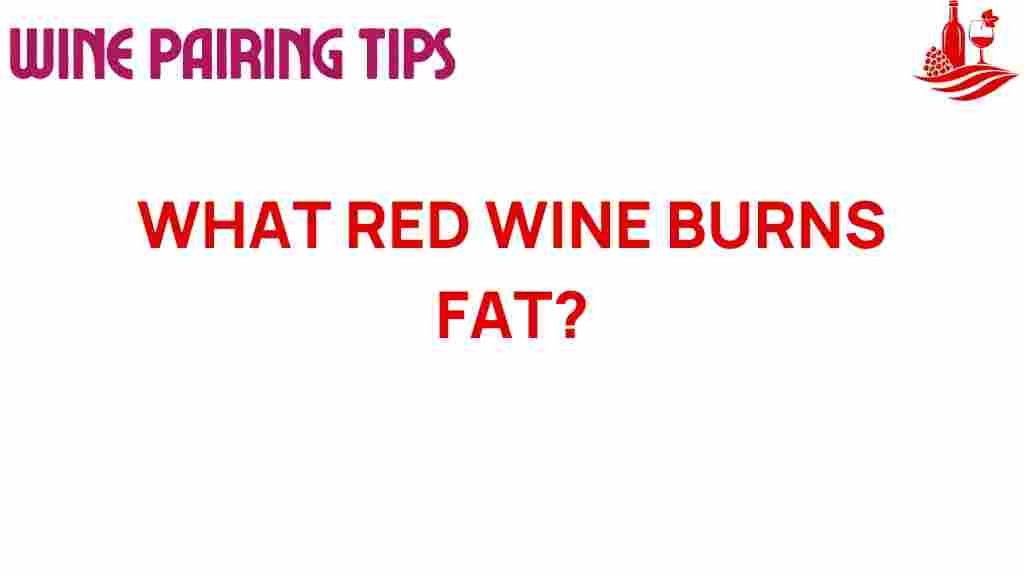Unlocking the Secrets: What Red Wine Burns Fat?
Red wine has long been a favorite among many for its rich flavors and social appeal, but recent studies have illuminated its potential benefits beyond mere enjoyment. Particularly, the link between red wine and fat-burning has captured the attention of health enthusiasts and casual drinkers alike. In this article, we’ll explore how red wine can contribute to weight loss, the health benefits it provides, and the key components responsible for its fat-burning properties.
The Connection Between Red Wine and Fat-Burning
The idea that red wine can aid in fat-burning is largely attributed to its antioxidant content, particularly a compound known as resveratrol. This polyphenol, found in the skins of red grapes, has been linked to various health benefits, including improved metabolism and fat oxidation. But how exactly does red wine contribute to weight loss? Let’s delve deeper.
Key Components of Red Wine
Understanding how red wine aids in fat-burning requires a closer look at its main components:
- Resveratrol: A powerful antioxidant that may help reduce body fat, improve insulin sensitivity, and promote overall metabolic health.
- Flavonoids: Another type of antioxidant that helps protect the body against oxidative stress and inflammation, which can affect weight management.
- Calories: While red wine does contain calories, moderation is key to balancing enjoyment with weight loss goals.
Health Benefits of Red Wine
In addition to its potential fat-burning effects, red wine has several health benefits, including:
- Heart Health: Moderate consumption of red wine has been linked to a reduced risk of heart disease.
- Anti-Inflammatory Properties: The antioxidants in red wine can help reduce inflammation in the body.
- Improved Longevity: Studies suggest that resveratrol may contribute to a longer lifespan by promoting cellular health.
How to Incorporate Red Wine for Weight Loss
To effectively include red wine in your weight loss journey, consider the following steps:
1. Choose the Right Varieties
Not all red wines are created equal. Some varieties are higher in resveratrol and antioxidants. Here are a few to consider:
- Pinot Noir: Known for having one of the highest resveratrol contents.
- Cabernet Sauvignon: Rich in antioxidants and full-bodied flavor.
- Merlot: A smooth option that still offers health benefits.
2. Practice Moderation
Moderation is essential when it comes to reaping the benefits of red wine without overindulging. Aim for:
- No more than one glass per day for women.
- No more than two glasses per day for men.
3. Pair with Healthy Meals
Red wine can complement healthy meals, enhancing flavors while contributing to a balanced diet. Consider pairing red wine with:
- Grilled vegetables
- Lean proteins, like chicken or fish
- Whole grains, such as quinoa or brown rice
Potential Challenges and Troubleshooting Tips
While red wine can be part of a healthy lifestyle, it can also present challenges. Here are some tips to navigate potential pitfalls:
1. Managing Caloric Intake
Red wine contains calories, so it’s important to be mindful of overall caloric intake. To manage this:
- Track your daily caloric consumption.
- Opt for lower-calorie food pairings.
2. Avoiding Overindulgence
To prevent overconsumption, consider:
- Setting specific days for wine enjoyment.
- Choosing smaller glass sizes to control portions.
3. Understanding Individual Responses
Everyone’s body reacts differently to alcohol. Pay attention to how red wine affects your weight loss journey. If you find that it hinders your progress, it may be worth reconsidering its inclusion.
Conclusion: Savoring the Benefits of Red Wine
In conclusion, red wine can indeed play a role in fat-burning and weight loss, primarily through its antioxidant properties and the presence of resveratrol. By choosing the right varieties and consuming it in moderation, you can enjoy the health benefits while still working towards your weight loss goals. Remember, balance is key, and integrating red wine into a healthy lifestyle can enhance both your enjoyment of food and your overall well-being.
For more information on nutrition and health benefits, check out this comprehensive guide. And if you’re looking for a selection of fine wines, visit this site for some excellent recommendations.
This article is in the category Tips and created by Wine Pairing Tips Team
